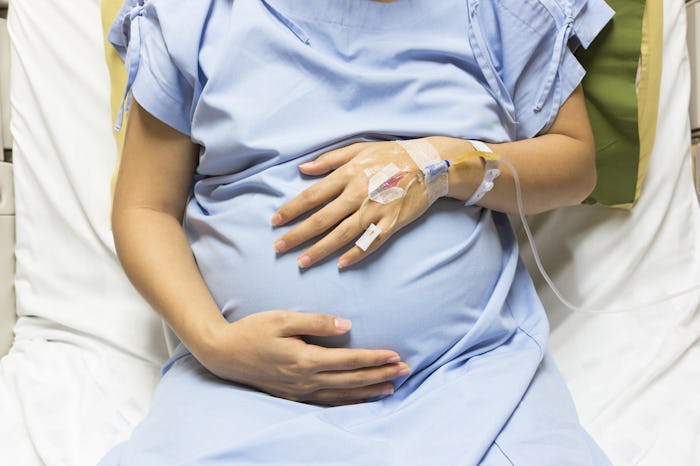News
Emergency C-Sections May Increase New Moms' Risk Of Developing PPD, Study Finds
Keeping new moms physically healthy is important, but so is making sure that their mental health is taken care of, too. A new study found that emergency c-sections may increase moms' risk of developing PPD. With c-sections becoming increasingly popular in the world, medical professionals need to be aware of the impact the procedure can have. Studies like this can help both new moms and their doctors better understanding how moms are doing after they give birth.
In 2018, a team of doctors found that cesarean section rates are rising, as reported by NPR. Multiple studies in The Lancet found that, since 1990, c-sections have more than tripled, from 6 percent of all births to 21 percent, as NPR noted.
C-sections take an obvious physical toll on somebody, because it is a surgery. WebMD noted that emergency c-sections include an increased risk of severe hemorrhage, complications from quickly administering anesthesia, and accidental injury. Doctors know to look out for these physical complications but, now, a new study points out the need to look after something else, as well.
The study, from the University of York, examined data from 5,000 first-time moms from the UK Millennium Cohort Study, a representative sample of the UK population, as reported by Medical Xpress. They found that first-time moms who have emergency c-sections have a 15 percent higher risk of developing postpartum depression, as EurekAlert! reported.
There are two c-sections you can have: an emergency or an elective procedure (also known as a scheduled c-section). Many mamas find elective c-sections much easier to recover from. Emergency c-sections, on the other hand, can be traumatic for moms because they're an emergency. According to WebMD, a doctor decides to do an emergency c-section if the mom or baby are in a dire situation and delivering the baby right away is the only available option.
The study focused on first-time mothers so that researchers could focus on the effects of that particular birthing experience, as EurekAlert! noted.
Dr. Valentina Tonei, of the department of economics at the University of York, said the study's findings are "striking," according to Medical Xpress, adding:
Unplanned caesareans may have a particularly negative psychological impact on mothers because they are unexpected, usually mentally and physically stressful and associated with a loss of control and unmatched expectations.
It makes complete sense, then, that new moms who have experienced that kind of procedure might be at an increased risk for developing postpartum depression. Postpartum depression is a "severe, long-lasting form of depression" that can occur after birth, Mayo Clinic noted, so it is a big thing that doctors should know to look out for.
Dr. Tonei noted, according to EurekAlert!, that this study, "has important implications for public health policy, with new mothers who give birth this way in need of increased support."
Although the study was conducted in the United Kingdom, it definitely carries over into the United States, too. The Centers for Disease Control and Prevention reported about 1 in 9 women experience symptoms of postpartum depression, but that number can change due to factors like to age or race/ethnicity. According to the CDC, the number of new moms who experience PPD can be different based upon the state in which you are, and can be as high as 1 in 5.
Looking out for a new moms' physical health is obviously necessary, especially after an unplanned c-section. But, this study reminds everyone that looking after a new mom's mental health is important, too.
